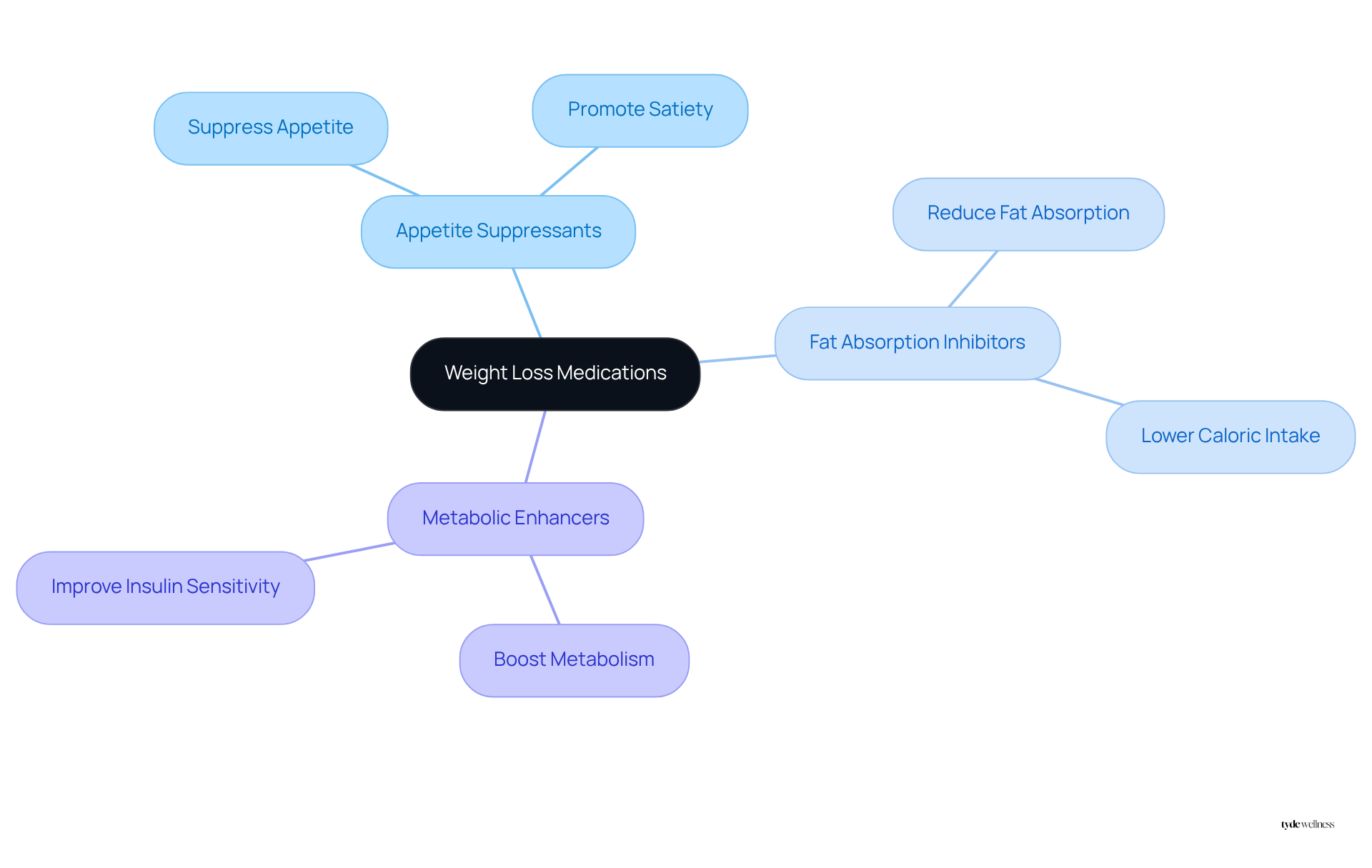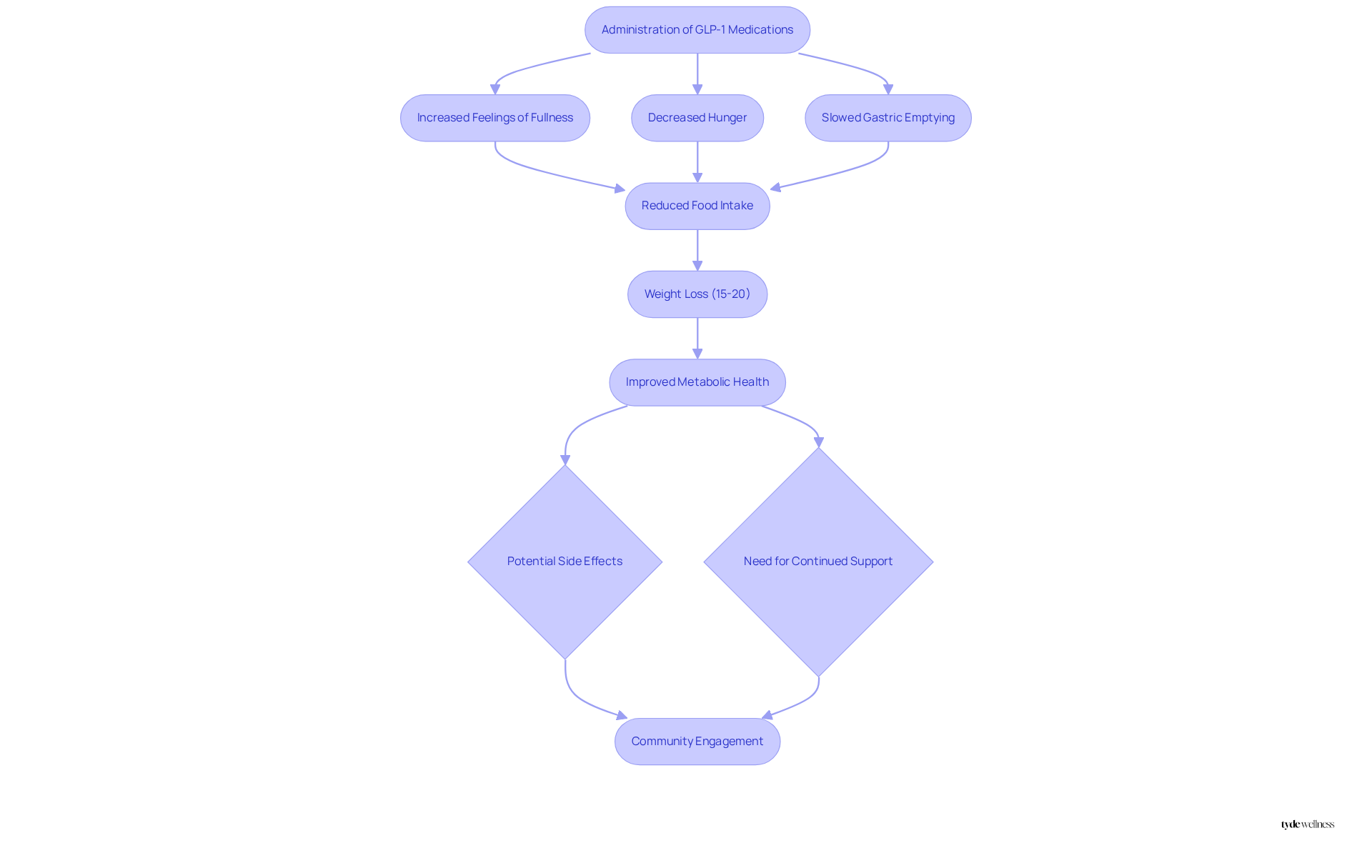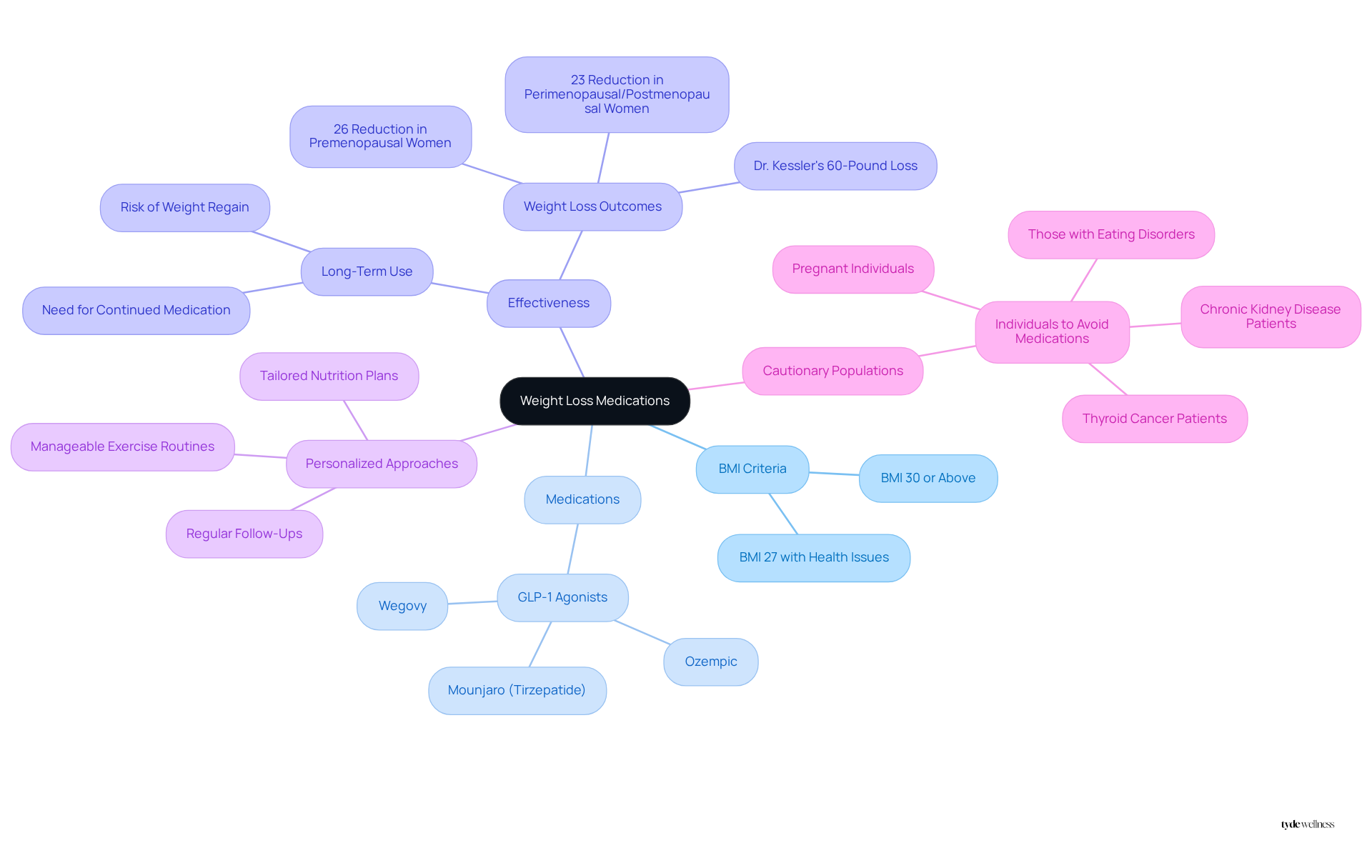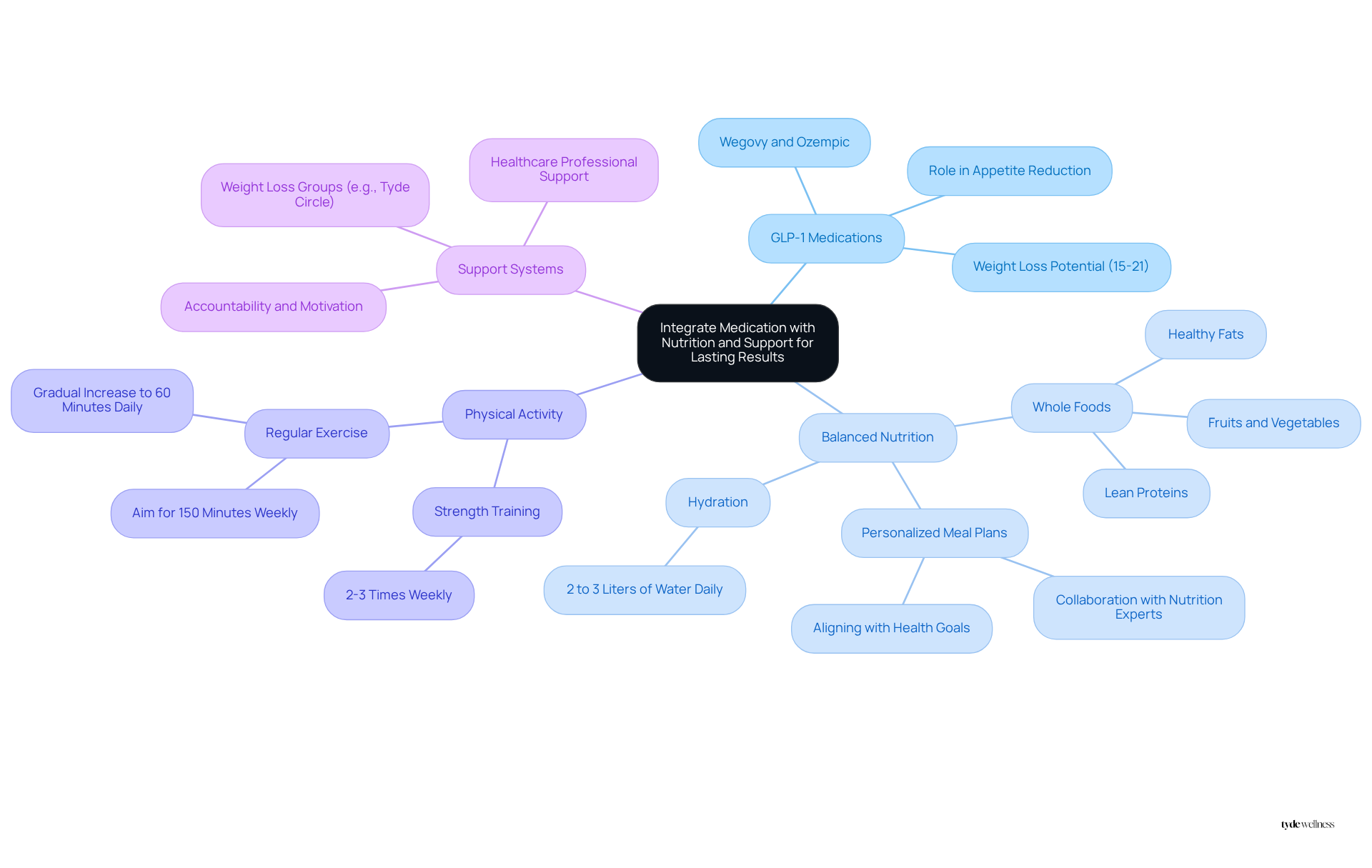Overview
GLP-1 therapy, particularly medications such as Semaglutide and Tirzepatide, offers an effective weight loss solution for women, especially during hormonal changes like menopause. These medications work by suppressing appetite and enhancing metabolic health. Studies indicate that women using these therapies can achieve significant reductions in body mass, with some experiencing up to a 26% decrease. This highlights the necessity of integrating medication with personalized nutrition and ongoing support to achieve optimal results.
Introduction
The landscape of weight loss solutions is evolving, with new medications like GLP-1 therapy emerging as significant advancements, particularly for women undergoing hormonal transitions. These FDA-approved treatments feature appetite suppression and improved metabolic health, providing essential support for those facing challenges in weight management during critical life stages.
However, an important question arises: how can individuals effectively incorporate these therapies into their overall health strategies to achieve lasting results?
This article explores the complexities of GLP-1 medications, their advantages, and the holistic approach required for successful weight loss.
Explore the Basics of Weight Loss Medications
Substances designed to reduce body mass are crucial in helping individuals achieve their body reduction goals by modifying the physiological processes related to appetite and metabolism. At Tyde Wellness, we utilize FDA-approved GLP-1 treatments, including Semaglutide and Tirzepatide, which serve as a new medication for weight loss by suppressing appetite and improving metabolic health. These medications can be classified into different categories:
- Appetite suppressants
- Fat absorption inhibitors
- Metabolic enhancers
Each category serves a specific purpose, enabling patients and healthcare providers to make informed decisions tailored to individual needs.
For women, especially those undergoing hormonal changes during perimenopause and menopause, these treatments can provide essential support in effectively managing body composition. Research indicates that approximately 70% of Americans are either overweight or obese, highlighting the importance of effective body mass management strategies. Furthermore, studies reveal that women using a new medication for weight loss during perimenopause can experience significant benefits, such as reductions in body mass and waist circumference.
At Tyde Wellness, our program encompasses doctor-guided care, personalized nutrition plans designed for busy lifestyles, and text-based coaching to ensure continuous support. Healthcare providers emphasize the importance of a holistic approach to weight loss, integrating pharmaceuticals with healthy eating and physical activity. As Dr. Dbouk remarks, “These treatments are designed to complement healthy eating and physical activity,” underscoring the necessity for a comprehensive strategy.
Consulting with a healthcare provider is vital to determine the most suitable treatment based on individual health needs and goals. With appropriate support, including and cost comparisons, women can successfully navigate the challenges of weight management during critical life stages, ultimately reclaiming their health and confidence.

Understand How GLP-1 Medications Work
Glucagon-like peptide-1 treatments function by mimicking a natural hormone crucial for appetite regulation and insulin secretion. Upon administration, these treatments significantly increase feelings of fullness, diminish hunger, and slow gastric emptying, collectively resulting in reduced food intake.
Clinical studies indicate that individuals using a new medication for weight loss can achieve substantial fat loss, typically ranging from 15% to 20% of their body mass over time. Moreover, these treatments enhance metabolic health, improving blood sugar control and lowering the risk of obesity-related conditions.
For women, particularly those undergoing menopause, this therapy offers a valuable option as a new medication for weight loss linked to hormonal changes, thereby fostering overall health and well-being during this transitional period.
At Tyde Wellness, we advocate for a holistic approach that encompasses personalized nutrition plans, text-based coaching, and optional peptide treatments to ensure sustainable results. It is also essential to incorporate high-fiber foods to mitigate gastrointestinal issues, a common concern for individuals on certain treatments.
While these treatments can significantly improve health outcomes, and gastrointestinal discomfort must be considered. Continuous support and comprehensive strategies for weight management are vital after discontinuing specific treatments to maintain results and overall wellness, underscoring the importance of community engagement through initiatives like Tyde Circle, which empowers women to share their experiences and offer mutual support.

Evaluate Who Should Consider Weight Loss Medications
Weight loss treatments, particularly certain therapies, are often recommended for individuals with a body mass index (BMI) of 30 or above, or a BMI of 27 or greater when accompanied by obesity-related health issues such as diabetes or hypertension. For women experiencing significant weight gain during perimenopause or menopause, these treatments can be particularly beneficial, as hormonal changes may complicate weight management.
Medications like Wegovy and Ozempic work by mimicking a naturally occurring hormone in the body, helping to regulate blood sugar, suppress appetite, slow stomach emptying, and reduce cravings. Real-world examples illustrate this effectiveness: Dr. David A. Kessler, a former FDA Commissioner, lost approximately 60 pounds within seven months of starting these injections, highlighting the potential efficacy of these therapies.
Additionally, studies show that women in the premenopausal phase experienced a 26% reduction in mass with tirzepatide, compared to only 2% with a placebo. In contrast, perimenopausal and postmenopausal women saw decreases of 23% versus 3% with placebo. Given these findings, it is crucial for prospective candidates to consult healthcare professionals to assess their health status, explore the potential benefits and risks of the therapy, and determine if weight loss medications are appropriate for their specific circumstances.
This personalized approach includes:
- Tailored nutrition plans
- Manageable exercise routines
- Regular follow-ups from the care team
Ensuring women can effectively navigate their weight loss journey, particularly during significant life transitions. It is also vital to consider dietary management while undergoing these treatments, as maintaining a balanced diet rich in protein and fiber can help prevent gastrointestinal complications.
Certain populations should avoid these medications, including individuals with specific thyroid and endocrine cancers, chronic kidney disease, and active eating disorders. Finally, the additional benefits of these treatments, including the new medication for weight loss, such as reduced clotting and inflammation, decreased cardiovascular risk, and improvements in blood pressure and cholesterol levels, should be emphasized.
Waist circumference measurements also serve as an important indicator of visceral fat, which is essential in assessing health risks associated with obesity. The program is priced at $139 per month plus insurance copay, making it accessible for those seeking comprehensive support.

Integrate Medication with Nutrition and Support for Lasting Results
To achieve lasting results in body mass reduction through these therapies, it is essential to integrate them with a balanced nutrition strategy and ongoing support. A diet rich in whole foods—such as fruits, vegetables, lean proteins, and healthy fats—can enhance the effectiveness of this therapy by promoting satiety and reducing cravings.
Research indicates that GLP-1 treatments, including Wegovy and Ozempic, can lead to significant reductions in body mass, ranging from 15% to 21%, underscoring the critical role of dietary habits. Furthermore, participating in regular physical activity and seeking support from healthcare professionals or weight loss groups, such as the Tyde Circle, can provide the necessary accountability and motivation.
Women, especially those experiencing hormonal changes, may benefit from collaborating with a nutrition expert to create that align with their health goals and lifestyle. JoAnn E. Manson emphasizes that a comprehensive strategy, which incorporates a new medication for weight loss along with tailored nutrition and exercise interventions, is vital for success.
Additionally, maintaining hydration by consuming 2 to 3 liters of fluid daily, primarily water, is crucial for individuals on GLP-1 medications. Incorporating strength training into the regimen is also important for preserving muscle mass during weight reduction. This comprehensive approach not only aids in body mass reduction but also improves overall health while addressing potential side effects, such as gastrointestinal issues.
At Tyde Wellness, we empower women through personalized weight loss solutions, including GLP-1 therapy and holistic support, to foster sustainable health and wellness.

Conclusion
GLP-1 therapy represents a groundbreaking advancement in weight loss medication, particularly beneficial for women navigating hormonal changes during critical life stages. By effectively suppressing appetite and enhancing metabolic health, these treatments offer a promising solution for those struggling with weight management. The integration of GLP-1 medications into a holistic approach—combining personalized nutrition, exercise, and continuous support—ensures a comprehensive strategy for achieving sustainable results.
Key insights throughout the article have highlighted the efficacy of GLP-1 medications, such as Semaglutide and Tirzepatide, in promoting significant fat loss while improving overall health. The importance of personalized care, including tailored nutrition plans and regular follow-ups, emphasizes the necessity of a supportive environment for women embarking on their weight loss journey. Furthermore, understanding potential side effects and the importance of community support further strengthens the approach to weight management.
Ultimately, the significance of GLP-1 therapy extends beyond mere weight reduction; it encompasses a holistic view of health and wellness. Women are encouraged to consult healthcare professionals to assess their individual needs and explore the benefits of these medications. By integrating GLP-1 therapy with healthy lifestyle choices and a strong support system, achieving lasting health transformations becomes an attainable goal.
Frequently Asked Questions
What are weight loss medications and how do they work?
Weight loss medications are substances designed to reduce body mass by modifying physiological processes related to appetite and metabolism. They help individuals achieve their body reduction goals.
What types of weight loss medications does Tyde Wellness use?
Tyde Wellness utilizes FDA-approved GLP-1 treatments, including Semaglutide and Tirzepatide, which suppress appetite and improve metabolic health.
What categories do weight loss medications fall into?
Weight loss medications can be classified into three categories: appetite suppressants, fat absorption inhibitors, and metabolic enhancers.
How can weight loss medications benefit women during hormonal changes?
For women undergoing hormonal changes during perimenopause and menopause, weight loss medications can provide essential support in managing body composition effectively.
What percentage of Americans are affected by overweight or obesity?
Approximately 70% of Americans are either overweight or obese, highlighting the need for effective body mass management strategies.
What benefits can women experience from using new weight loss medications during perimenopause?
Research indicates that women using new weight loss medications during perimenopause can experience significant benefits, such as reductions in body mass and waist circumference.
What does the Tyde Wellness program include for weight loss support?
The Tyde Wellness program includes doctor-guided care, personalized nutrition plans for busy lifestyles, and text-based coaching for continuous support.
Why is a holistic approach important in weight loss?
A holistic approach to weight loss is important because it integrates pharmaceuticals with healthy eating and physical activity, ensuring a comprehensive strategy for effective weight management.
Why is consulting with a healthcare provider crucial for weight loss treatment?
Consulting with a healthcare provider is vital to determine the most suitable treatment based on individual health needs and goals, ensuring personalized care.
How can women navigate the challenges of weight management during critical life stages?
With appropriate support, including guidance on insurance coverage and cost comparisons, women can successfully navigate the challenges of weight management during critical life stages, ultimately reclaiming their health and confidence.
List of Sources
- Explore the Basics of Weight Loss Medications
- New Prescription Weight Loss Drugs: What’s All the Hype? (https://emoryhealthcare.org/stories/wellness/new-prescription-weight-loss-drugs-whats-all-the-hype)
- Tufts Experts Weigh in on New Generation of Weight Loss Medications | School of Medicine (https://medicine.tufts.edu/news-events/news/tufts-experts-weigh-new-generation-weight-loss-medications)
- Women in Menopause Benefit From GLP-1 Weight-Loss Medications as Much as Younger Women | Research | Advances in Endocrinology, and Women’s Health | NewYork-Presbyterian (https://nyp.org/advances/article/women-in-menopause-benefit-from-glp-1-weight-loss-medications-as-much-as-younger-women)
- Monthly weight loss drug helps people lose 20% of body weight, trial finds (https://nbcnews.com/health/health-news/monthly-weight-loss-drug-helps-people-lose-20-body-weight-trial-finds-rcna214080)
- Understand How GLP-1 Medications Work
- How does Ozempic work? Understanding GLP-1s for diabetes, weight loss, and beyond – Harvard Health (https://health.harvard.edu/staying-healthy/how-does-ozempic-work-understanding-glp-1s-for-diabetes-weight-loss-and-beyond)
- GLP-1s for weight loss have heart benefits, too (https://news.sanfordhealth.org/heart/glp-1-weight-loss-heart-benefits)
- Advice for trying GLP-1 drugs for weight loss from a doctor who’s been there (https://npr.org/2025/06/15/nx-s1-5432864/weight-loss-drugs-glp1-wegovy-mounjaro)
- I Am Taking a GLP-1 Weight-Loss Medication—What Should I Know? (https://jamanetwork.com/journals/jamainternalmedicine/fullarticle/2836527)
- Evaluate Who Should Consider Weight Loss Medications
- Yes, Weight Loss Drugs May Benefit Women in Menopause—Here’s What to Know (https://health.com/menopause-weight-loss-ozempic-wegovy-8410817)
- Advice for trying GLP-1 drugs for weight loss from a doctor who’s been there (https://npr.org/2025/06/15/nx-s1-5432864/weight-loss-drugs-glp1-wegovy-mounjaro)
- Women in Menopause Benefit From GLP-1 Weight-Loss Medications as Much as Younger Women | Research | Advances in Endocrinology, and Women’s Health | NewYork-Presbyterian (https://nyp.org/advances/article/women-in-menopause-benefit-from-glp-1-weight-loss-medications-as-much-as-younger-women)
- GLP-1 medications and weight loss: Helping patients navigate beyond the trends (https://wolterskluwer.com/en/expert-insights/glp-1-medications-and-weight-loss-help-patients-navigate-beyond-trends)
- I Am Taking a GLP-1 Weight-Loss Medication—What Should I Know? (https://jamanetwork.com/journals/jamainternalmedicine/fullarticle/2836527)
- Integrate Medication with Nutrition and Support for Lasting Results
- I Am Taking a GLP-1 Weight-Loss Medication—What Should I Know? (https://jamanetwork.com/journals/jamainternalmedicine/fullarticle/2836527)
- GLP-1s: Miracle drug or missed opportunity? (https://uclahealth.org/news/article/glp-1s-miracle-drug-or-missed-opportunity)
- Why Diet and Exercise Still Matter During Treatment with GLP-1 Medications | Mass General Brigham (https://massgeneralbrigham.org/en/about/newsroom/press-releases/why-diet-exercise-matters-while-taking-glp-1-medications)
- GLP-1 Therapy for Obesity Requires Substantial Nutritional Framework, Multidisciplinary Support, Joint Advisory Warns (https://patientcareonline.com/view/glp-1-therapy-for-obesity-requires-substantial-nutritional-framework-multidisciplinary-support-joint-advisory-warns)
- Food and fitness make or break success on weight loss meds, report finds (https://abcnews.go.com/GMA/Wellness/food-fitness-make-break-success-weight-loss-meds/story?id=122324834)



